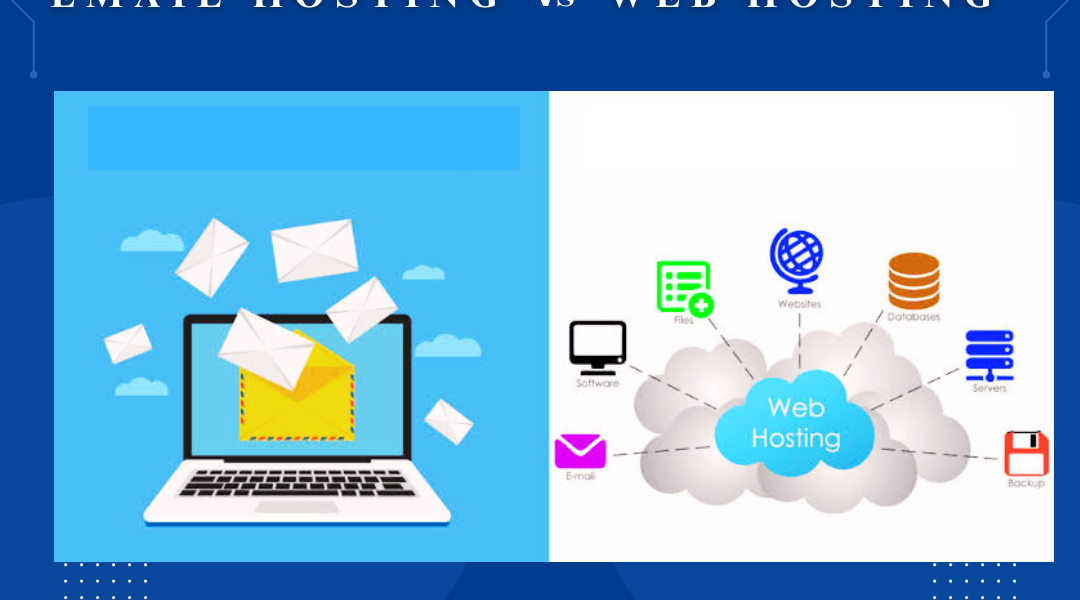
The Differences Between Email Hosting and Web Hosting
In the digital age, maintaining a professional online presence is crucial for businesses and individuals. Two services that often cause confusion are email hosting and web hosting. While both are essential for different aspects of online operations, they serve very distinct purposes. This article delves into the differences between email hosting and web hosting, providing a comprehensive understanding of their roles, benefits, and how to choose the right service for your needs.
What is Email Hosting?
Email hosting is a service that manages email servers, enabling users to send, receive, and store emails on a dedicated or shared server. Unlike free email services such as Gmail or Yahoo Mail, email hosting provides businesses with a personalized email address that uses their own domain name (e.g., yourname@yourcompany.com). This personalization enhances professional credibility and offers greater control over email management and security.
Features of Email Hosting
These are the features of Email Hosting:
1. Custom Domain Email Addresses: Using your domain name in email addresses (e.g., john.doe@company.com) creates a professional image and reinforces your brand identity.
2. Advanced Security: Email hosting services often include robust security measures such as spam filtering, antivirus protection, and encryption to safeguard sensitive communications.
3. Ample Storage: Depending on the hosting plan, email hosting can provide substantial storage space for emails and attachments.
4. Technical Support: Dedicated email hosting providers usually offer technical support to help resolve any issues related to email management.
5. Flexibility: As your business grows, you can easily scale your email hosting service to add more email accounts or increase storage capacity.
What is Web Hosting?
Web hosting, on the other hand, is a service that provides the technologies and infrastructure needed to make a website accessible on the internet. When you create a website, its files, such as HTML, CSS, images, and videos—need to be stored on a server. Web hosting companies supply the server space, network connectivity, and other resources to ensure your website is available online 24/7.
Features of Web Hosting
The following are the features of Web Hosting:
1. Server Space: Web hosting provides the storage space necessary for your website’s files.
2. Domain Management: Web hosting services often include tools for managing your domain name, making it easy to link your domain to your website.
3. Bandwidth: Adequate bandwidth ensures that your website can handle varying levels of traffic without performance issues.
4. Security Features: Web hosting services typically offer security measures such as SSL certificates, firewalls, and regular backups to protect your website data.
5. Content Management Systems (CMS): Many web hosting providers support the installation of CMS platforms like WordPress, Joomla, and Drupal, which facilitate easy website creation and management.
Key Differences Between Email Hosting and Web Hosting
The key differences between Email Hosting and Web Hosting are listed below;
Purpose and Functionality
The primary distinction between email hosting and web hosting lies in their core functions:
– Email Hosting: Manages email accounts, handles incoming and outgoing emails, provides spam filtering, and offers storage for email data.
– Web Hosting: Stores website files, manages domain names, handles web traffic, and ensures that a website is accessible online.
Technical Requirements
Both services require different technical setups and resources:
– Email Hosting: Requires email servers optimized for handling email protocols such as SMTP, IMAP, and POP3. These servers need robust security measures to protect against spam, phishing, and malware.
– Web Hosting: Utilizes web servers designed to handle HTTP/HTTPS requests. These servers must efficiently manage bandwidth, storage, and website performance, as well as security measures to protect against cyber threats.
Customization and Control
The level of customization and control differs between the two services:
– Email Hosting: Offers more customization in terms of email addresses, storage limits, and security settings. Users can create multiple email accounts under their domain, set up aliases, and manage spam filters.
– Web Hosting: Provides control over website management, including file storage, database management, and domain settings. Users can install various applications (like CMS platforms), customize website code, and manage backups.
Benefits of Email Hosting
These are the benefits of Email Hosting:
1. Professionalism: A custom email address that matches your domain name looks more professional than using a free email service.
2. Security: Email hosting services often include advanced security features, such as encryption and spam filtering, to protect sensitive information.
3. Support: Dedicated email hosting providers usually offer technical support to help with any issues related to email management.
4. Storage and Adjustability: Businesses can choose plans that offer ample storage and adjustable solutions to accommodate growing email needs.
5. Reliability: With email hosting, businesses can expect reliable service with minimal downtime, ensuring continuous email communication.
Benefits of Web Hosting
These are the benefits of Web Hosting:
1. Online Presence: Web hosting is essential for getting your website online, making it accessible to users worldwide.
2. Performance: Good web hosting ensures that your website loads quickly and performs well, which is crucial for user experience and SEO.
3. Security: Web hosting services include security measures such as SSL certificates, firewalls, and regular backups to protect your website data.
4. Support: Reliable web hosting providers offer customer support to help with any technical issues or questions about website management.
5. Customization: Web hosting allows extensive customization options for your website, enabling you to tailor the site to your specific needs.
Choosing the Right Service for Your Needs
When deciding between email hosting and web hosting, consider the following:
– Your Primary Needs: Determine if your primary need is for professional email communication or establishing an online presence with a website.
– Combined Services: Many providers offer packages that include both email and web hosting, which can be cost-effective and convenient for businesses looking to streamline their services.
– Budget: Evaluate your budget and choose a plan that provides the necessary features without overextending your finances.
– Flexibility: Consider future growth. Choose a service that can scale with your business, whether that means adding more email accounts or increasing website storage and bandwidth.
– Provider Reputation: Research potential providers, read reviews, and assess their reputation for reliability, security, and customer support.
Conclusion
In summary, email hosting and web hosting are distinct services tailored to different needs. Email hosting ensures professional, secure, and efficient email communication, while web hosting is essential for making your website accessible online. Understanding the differences and benefits of each can help you make informed decisions to support your business’s online activities. Whether you need one service or both, choosing the right provider and plan is crucial for maintaining a robust and professional online presence.



